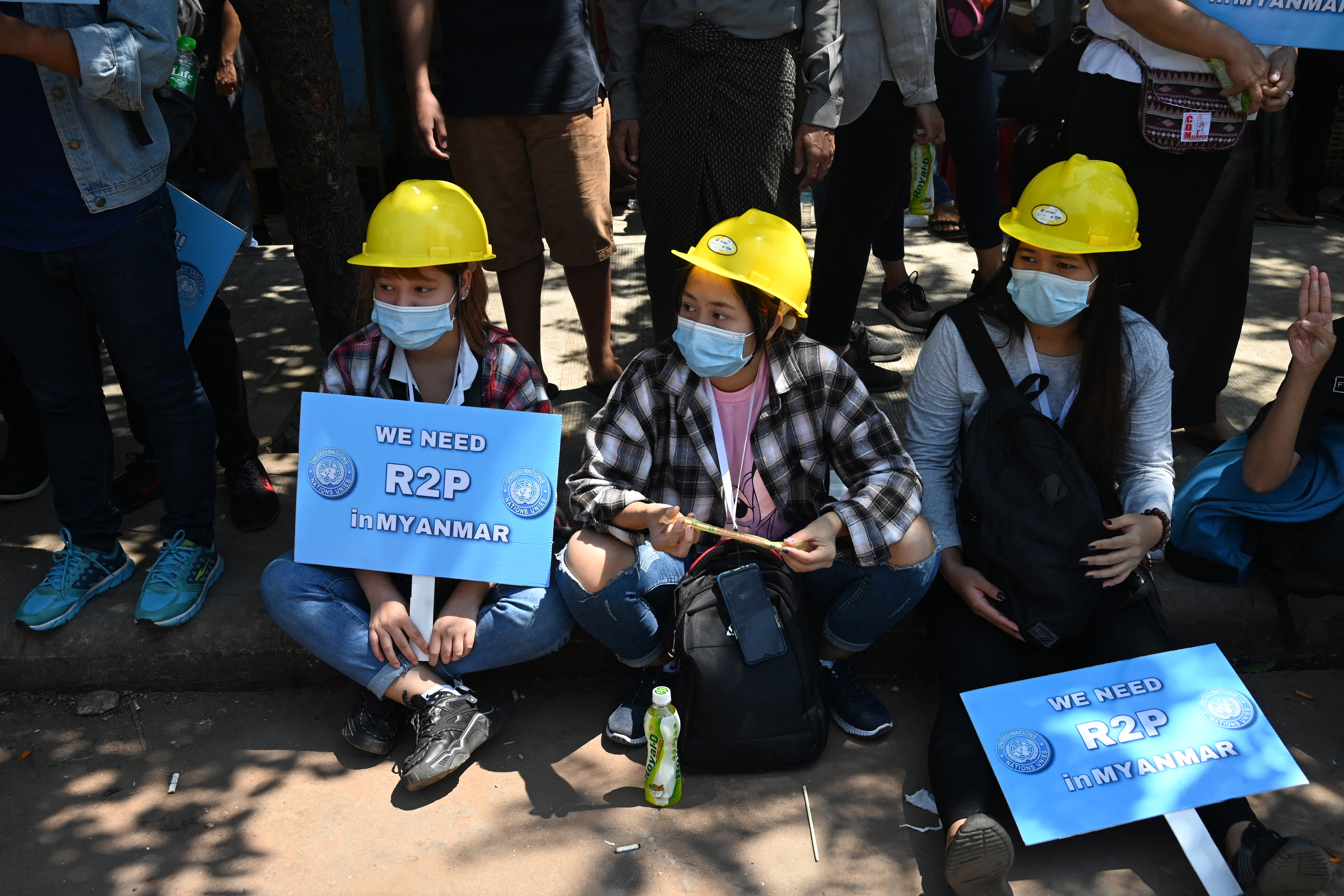More than 50 people shot dead, neighborhoods terrorized in nightly raids, and nearly 2,000 people arrested—the crackdown on opponents of the Myanmar coup is leading to mounting calls for armed intervention to stop the bloodshed.
“I want to request a collaborative military action from different countries,” a young protester in Yangon told VICE World News during the deadliest week of the nationwide revolt, requesting anonymity to speak freely. “More and more people are dying.”
Videos by VICE
“I want to request a collaborative military action from different countries.”
As strikes and boycotts challenge the junta, images from the nationwide revolt also show protesters openly calling for some sort of outside intervention that goes beyond statements. Many invoke the so-called Responsibility to Protect known as R2P. At a rally in Yangon on Friday, dozens chanted “we need R2P, we want democracy,” pleading with the international community to step in.
Adopted at the UN World Summit in 2005, R2P is a commitment by United Nations member states to prevent genocide, war crimes, ethnic cleansing and crimes against humanity. It stipulates that if a nation fails to protect its own people, the global community has an obligation to act. Critics of R2P, which encompasses a variety of potential actions, say it could complicate or worsen the situation on the ground. They also argue that any armed presence would have too many unexpected consequences. But the call has become a mainstay on placards and in protest slogans in Myanmar.

UN Security Council members met in a closed-door session on Friday to discuss what to do about the escalating situation, as arrests and killings continued. Footage has circulated online of troops savagely beating protesters, using automatic weapons, and dragging away dead bodies in what some observers say could be a calculated attempt to hide the real death count.
Some of Myanmar’s most prominent opposition leaders have joined the demands for bolder, decisive action.
Dr. Sasa, a popular politician chosen by lawmakers ousted in the coup as the Special Envoy to the UN, recently wrote an open letter to the Security Council to do “everything it can” to increase pressure on the regime and restore the democratically-elected government led by Aung San Suu Kyi, who was arrested at the start of the coup on Feb. 1.
But whether that means foreign boots on the ground or a coordinated pressure campaign that isolates the junta and deprives it of weapons is the subject of fierce debate.
Simon Adams, the executive director of the Global Centre for the Responsibility to Protect, an organization that works to prevent mass atrocities, told VICE World News that “what is absolutely clear is that statements of concern are not going to be enough.”
But he said the path is not as clear cut as it seems.
“The choice is not between invasion and inaction. To start with, they [the UN] could impose an arms embargo in order to deny the military the weapons they are using to wage war on their own people,” he said.
He added that China could shield Myanmar from accountability at the UN, and it’s likely that the generals are hoping that any proposed action from the Security Council won’t have support from Beijing.
It’s also up to the Security Council to determine if a peacekeeping operation should be deployed in a given crisis, but it’s a complex process requiring many hurdles.
Any meaningful escalation would take serious diplomatic finesse, said Kelley Currie, a Myanmar specialist who worked for the Trump administration as an ambassador on the Economic and Social Council of the United Nations.
“At this point, I don’t want to exclude the possibility of a deployment and am increasingly supportive of pushing for some kind of international presence on the ground,” Currie told VICE World News. “If Burma were in Africa, we would already be negotiating a deployment with the African Union. But because the relevant regional organization is ASEAN [the Association for Southeast Asian Nations], which currently lacks the interest, will or capacity for mobilization on those lines, it will come down to the UN Security Council and what can be negotiated.”
“We already are at an inflection point. The military has made their decision and will only escalate violence,” she added. “They will keep ratcheting up unless something changes their strategic calculus—either internally or externally or both.”
“At this point, I don’t want to exclude the possibility of a deployment and am increasingly supportive of pushing for some kind of international presence on the ground.”
In Myanmar, however, some activists think the dream of outside help is an illusion and should not be treated seriously to avoid giving false hopes.
Prominent Yangon-based pro-democracy figure Thinzar Shunlei Yi told VICE World News that she doesn’t believe the international community will do enough. She accused the UN of standing idly by as the same military committed atrocity after atrocity against their own people in remote areas for decades, with the campaign against Rohingya Muslims in 2017 only the most recent example.
“We are reminded almost daily that we’re dealing with the same army. Before this, we’ve seen countless war crimes by the army over the last 30 years. It’s the same army committing crimes in bright daylight,” she said.
But protesters say that unless the international community ramps up its response immediately, more innocent lives will be lost.
“We can’t fight back because we don’t have any guns,” said a 30-year-old protester in Yangon who also did not wish to be identified for security reasons. “When powerful countries take action against them [the military], it will save our lives because they are torturing us.”






